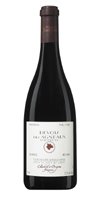How dumb was that? Devois des Agneaux d'Aumelas 1999

I taste little obvious fruit in Jeanjean's Devois des Agneaux d'Aumelas 1999 at first. What is there is very faint and unripened in flavour: raspberry, maybe cassis. At times the tartness verges into a vegetal bitterness. It reminds me of a wine from Anjou with its austere style. That idea would be intriguing to me except I'm opening a Syrah. So what's wrong here? My palate is off? Or is it the wine? Such would be the case with a "closed" wine or what is known as being "dumb". Dumb as in playing dumb since the bottle is fine -- it's not corked but rather is just not acting like it should. Closed as in temporarily -- or in a transitive state -- so you try to wait until the flavours that have shut down open up again. And wait, and wait...
Since 1870 the Famille Jeanjean has been bottling wines of great expression. Like many Languedoc wines, their bottles represent great value for the money. Château Valoussière, Coteaux du Languedoc is one of their great everyday wines, which I always recommend. Bring it along when you are invited to dinner and you will always get a positive reaction. Have it with merguez and saucisson, like I did with my friends Gordon and Eric, and you'll be as close as you can get to heaven for under $15. So it is no wonder that the Languedoc scene is burgeoning in recent years and growing in popularity. Witness a weekend last month, when Eric and I knew we were to sup in style. After browsing around on our own, we independently selected $19 Coteaux du Languedocs. He got a Château Saint-Martin Garrigue and I got the Domaine Clavel "Les Garrigues". Garrigue minds think alike!
But back to work: Devois des Agneaux d'Aumelas, Coteaux du Languedoc, Elisabeth and Brigette Jeanjean is a bit fancier than those above, but there it sits on my kitchen counter, all dressed up and nowhere to go. This cuvée was definitely not picking up where the Clavel had left off, that's for sure. I blamed myself at first. I had bought it at a reduced price because of a slightly damaged label. My thoughts turned to how I had stored it and how long I had kept it. The cork looked normal and no signs of leakage around the capsule presented themselves. There was no denying this 1999 its structure and complexity but it was still hitting all the wrong notes. Ones that clearly resonated in a bad way, like apple-cranberry sourness, a characteristic I hoped I would not begin to associate with the semi-aged wine of the region (I discovered a type of brownish cranberry-cola under the cork of a bottle of Domaine des Jougla Saint-Chinian 1999). So with time, I deem it dumb. But I felt dumb too for preparing the rare treat of filet mignon on this night. I try to salvage the situation in different ways. Giving it extra time to open up didn't change things much. Trying not to create Clavel-like expectations did more to help. I began agreeing with those tasters who proclaimed sage (not sure I appreciate that much in a wine), and I made the most of an odd changeable aroma. I moved it from Loire in style to Bourgogne. But dinner was over and it seemed as though I missed out big time. On the second night, I opted for the namesake on the bottle and poured the remaining wine with lamb. It was somewhat more satisfying but I still wondered whether I would've been right to return it to the store I bought it from.
Backwash
Thanks to Gordon for taking the image I posted in yesterday's space. He recalls not only taking the photo but also making the delicious pork loin sandwiches we ate with our wine. He had threatened to call both of his lawyers regarding these two omissions. To his intellectual property lawyer: I argue a fair dealing defense. To his French food litigator: Mets-en!







1 comment:
Hard to say what was wrong with this bottle since I didn't taste it, but my first reaction is to suspect that it should have been consumed a while ago.
These Languedoc wines and all wines of that caliber and price range rarely reward patience; they are meant to be drunk when they are released or within 1 to 3 years.
In fact, very few wines (in proportion to the total number produced in the world) actually improve with aging. So Carpe Vinum!
Post a Comment